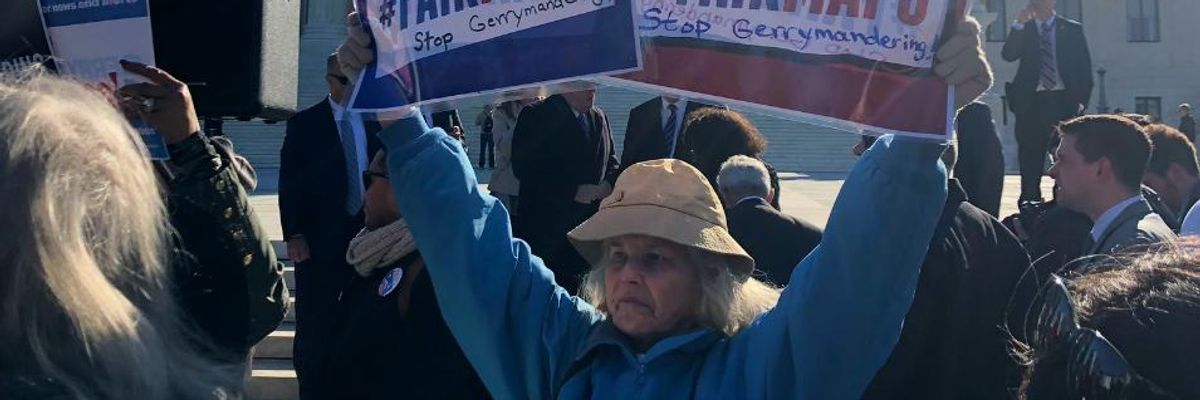Even as voting rights advocates urge the U.S. Supreme Court to "be on the right side of history" by putting voters and not lawmakers first, the court's right-wing majority indicated Tuesday it may refuse to impose constitutional limits on extreme partisan gerrymandering.
"Citizens in all 50 states deserve to be able to choose their representatives--and not the other way around."
--Paul Smith, CLC
"A familiar pattern repeated itself," the Washington Postreported Tuesday after two hours of oral arguments about politically motivated maps. "Liberal justices saw it as a threat to democracy that requires action while conservatives wondered how courts could ever decide when a political process becomes too political."
Justices on Tuesday heard arguments for bothLamone v. Benisek and Rucho v. Common Cause, which has been consolidated with Rucho v. League of Women Voters of North Carolina (LWVNC).
The political maps in these cases, which local leaders have acknowledged were intentionally drawn to benefit the political parties in power, gave an advantage to Republicans in North Carolina and Democrats in Maryland.
"Both Republicans and Democrats are guilty of rigging the system by drawing lines to maximize their own party's advantage, so these cases present the justices with a unique opportunity," said Paul Smith, vice president at the Campaign Legal Center (CLC) and counsel of record for Rucho v. LWVNC. "Voters nationwide are ready for a ruling that will put the voters and not lawmakers first."
Recent nationwide polling commissioned by CLC has shown (pdf) "broad, bipartisan support for the Supreme Court to set clear rules for when gerrymandering violates the Constitution," and advocates for voting rights gathered outside of the court building in Washington, D.C. on Tuesday.
"The court needs to be on the right side of history and stop politicians from infringing on the people's right to freely choose their representatives through voting," said Common Cause president Karen Hobert Flynn, calling the case in North Carolina "the most egregious partisan gerrymander the Supreme Court has ever seen."
However, current members of the nation's high court--which has ruled on racial but not partisan gerrymandering and "sidestepped the central questions" in another pair of cases last year--don't seem inclined crack down on constitutionally dubious map drawing.
Concluding that the justices on Tuesday "appeared unlikely" to put forth a new test to target partisan gerrymandering when they release their rulings, expected in June, NBC Newsreported:
The two newest justices, both appointed by President Donald Trump, said the Supreme Court should be especially reluctant to open the door to challenges based on excessive partisanship, given that more states are adopting methods such as redistricting commissions that take the map-drawing assignment away from legislatures.
"I don't dispute that extreme partisanship is a real danger in our country," Justice Brett Kavanaugh said. "But there's a fair amount of activity going on in the states to deal with it."
Justice Neil Gorsuch expressed a similar concern. "Why should we wade into this when there are alternatives that exist?"
As journalist Ari Berman, who has written extensively about voting rights, put it: "Presented with two cases of extreme partisan gerrymandering, the Supreme Court's conservative majority hinted that it might preserve these politically motivated maps in order to avoid what it seemed to regard as the most dangerous possible outcome: equal representation for all citizens."
"If court upholds extreme partisan gerrymandering that will allow Republicans to rig elections for next decade," Berman added on Twitter. "Pay attention to this."
"It is still possible for voters in North Carolina and Maryland to have fair maps drawn in time for the pivotal 2020 elections," said CLC's Smith. "Citizens in all 50 states deserve to be able to choose their representatives--and not the other way around."

